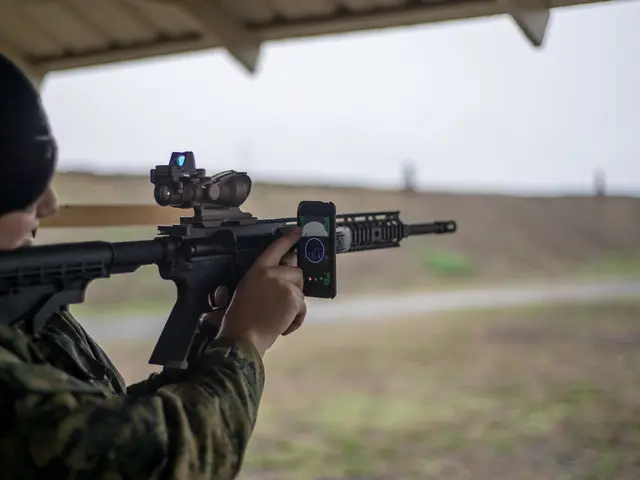Gaza-based militant group Hamas reacts to proposed truce agreement
Hamas has responded to a US-led proposition for a temporary ceasefire in the Gaza Strip, with Israeli officials also expressing approval. However, the militant group is seeking revisions to certain aspects of the agreement. The specifics of Hamas' response were not immediately disclosed.
In a statement, Hamas outlined its objectives for the proposed ceasefire. These include permanent cessation of hostilities, complete withdrawal of Israeli military from the Gaza Strip, and unhindered delivery of humanitarian aid. The agreement, according to Hamas, would also include the release of 10 living Israeli hostages and the remains of 18 others in exchange for a number of Palestinian prisoners.
A senior Hamas official informed The Associated Press that there are several points in the agreement that require adjustments, particularly with regards to US guarantees, the timing of hostage release, the delivery of aid, and the withdrawal of Israeli forces. The official requested anonymity due to the sensitive nature of the negotiations.
Meanwhile, Steve Witkoff, the US envoy to the Middle East, conveyed through a social media statement that Hamas' response to the proposal was "totally unacceptable" and that it represented a step backwards. Witkoff urged Hamas to accept the framework proposal as the foundation for proximity talks, to be initiated this coming week. He asserted that this was the only way to finalize a 60-day ceasefire deal within the coming days, allowing for the return of half of the living hostages and half of the deceased to their families.
Basem Naim, a member of Hamas' political bureau, stated in a separate statement that Hamas did not reject Witkoff's proposal. He emphasized that Hamas had provided a positive and responsible response, meeting the minimum demands and aspirations of the Palestinian people. Naim criticized the Israeli response, claiming it represented a violation of the integrity and fairness of mediation, and a bias towards the Israeli side.
A draft of the agreement obtained by our news outlet indicates that Israel would free 125 "life sentence" prisoners and 1,111 Palestinian detainees as part of the deal, in addition to 180 deceased Palestinians. Humanitarian aid would be sent to Gaza immediately upon Hamas' agreement to the terms of the deal.
At present, there has been no immediate response from mediators or Israeli officials.
In a separate incident, the United Nations Food Program revealed that 77 trucks carrying aid, mainly flour, were intercepted and stripped of their contents by hungry Palestinians before reaching their destinations. The WFP stated in a statement that after almost 80 days of blockade, communities were on the brink of famine and were no longer content to watch food pass them by. They emphasized that the delivery represented a start but far from enough.
A nearly three-month Israeli blockade on Gaza has driven the population of nearly 2.3 million people to the verge of starvation. Despite some relief in the recent days as Israel allowed some aid to enter, organizations highlight that there is still not enough food being supplied.
The United Nations has dubbed Gaza as the "hungriest place on Earth." The WFP said that to restore homes, ease fear, and prevent further chaos, they must swiftly flood the community with food. Only consistent, large-scale aid can rebuild trust.
A witness in the southern city of Khan Younis reported to The Associated Press that the U.N. convoy was stopped at a makeshift roadblock and offloaded by desperate civilians in large numbers. Most people carried bags of flour on their backs or heads. At one point, a forklift was used to offload pallets from the stranded trucks. The witness requested anonymity due to fear of reprisal.
The United Nations stated earlier this month that Israeli authorities had forced them to use unsecured routes within areas controlled by the Israeli military in the eastern regions of Rafah and Khan Younis, where armed gangs operate, and trucks were stopped. Israel's military did not immediately respond to a request for comment.
An internal document shared with aid groups about security incidents, seen by the Associated Press, mentioned four instances of facilities being looted in three days at the end of May, excluding the convoy on Saturday.
The U.N. says it has been hampered in its ability to get enough aid through because of ongoing fighting. On Friday, U.N. spokesperson Stephane Dujarric stated that only five truckloads of cargo were picked up from the Palestinian side of the Kareem Shalom crossing, with the other 60 trucks forced to return due to intense hostilities in the area.
An Israeli official claimed that his country had offered the U.N. logistical and operational support, but "the U.N. is not doing their job." Instead, a new US- and Israeli-backed foundation began operations in Gaza this week, distributing food at several sites in a hasty rollout. Israel asserted that the new mechanism is essential, as they accuse Hamas of diverting large amounts of aid. The U.N. denies that significant diversion occurs.
Cindy McCain, the WFP's executive director, told "Face the Nation with Margaret Brennan" last Sunday that there is no evidence to support Israel's claims that Hamas is responsible for the looting of aid trucks. "These people are desperate, and they see a World Food Programme truck coming in, and they run for it," she said. "This doesn't have anything to do with Hamas or any kind of organized crime, or anything. It has simply to do with the fact that these people are starving to death."
Israel's military campaign in Gaza is ongoing. The Gaza Health Ministry reported that at least 60 people were killed by Israeli strikes in the past 24 hours. Three people were shot by Israeli gunfire early Saturday morning in the southern city of Rafah, while three other people were killed, including a child and their parents, when their car was struck in Gaza City.
The war began when Hamas terrorists attacked Israel on Oct 7, 2023, resulting in the deaths of around 1,200 people, most of them civilians, and the capture of 250 hostages. Of the hostages taken captive, 58 remain in Gaza, but Israel believes 35 are dead, and Prime Minister Benjamin Netanyahu has expressed doubts about the fate of several others. Israeli strikes have killed over 54,000 residents of Gaza, mostly women and children, according to the Hamas-run Gaza Health Ministry, which does not distinguish between civilians and combatants in its tally.
- The agreement, as proposed by Hamas, includes the permanent cessation of hostilities, complete withdrawal of Israeli military from the Gaza Strip, unhindered delivery of humanitarian aid, the release of 10 living Israeli hostages and the remains of 18 others in exchange for a number of Palestinian prisoners.
- In a general news report, it was revealed that 77 trucks carrying aid, mainly flour, were intercepted and stripped of their contents by hungry Palestinians before reaching their destinations.
- A senior Hamas official expressed dissatisfaction with certain aspects of the agreement, particularly with regards to US guarantees, the timing of hostage release, the delivery of aid, and the withdrawal of Israeli forces.
- Steve Witkoff, the US envoy to the Middle East, expressed disappointment over Hamas' response to the proposal, calling it "totally unacceptable" and a step backwards, while urging Hamas to accept the framework proposal as the foundation for proximity talks.








